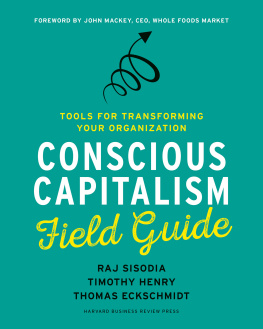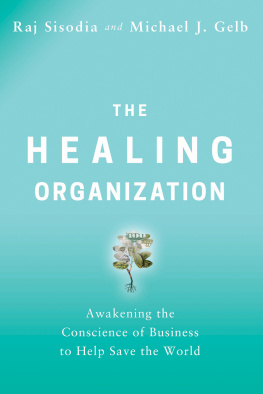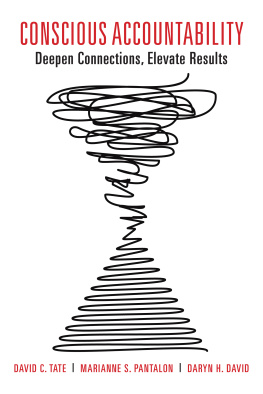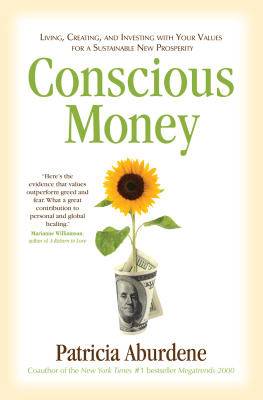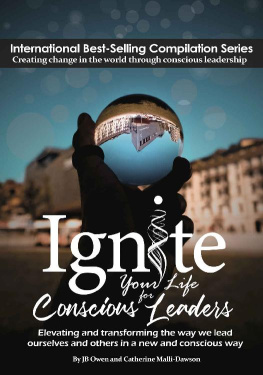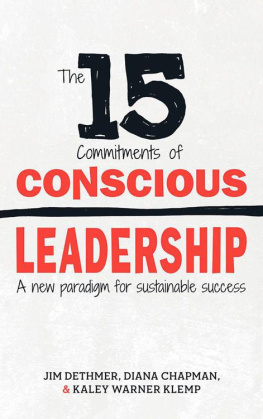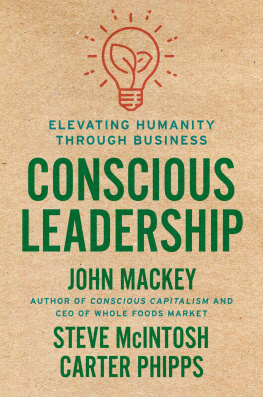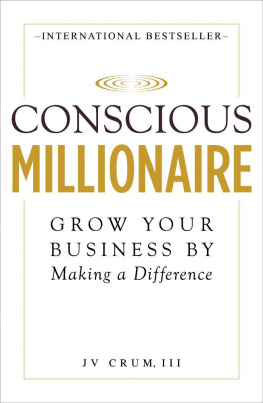A valuable workbook on how to turn business relationships from win-lose into win-win-win.
William Ury, coauthor, Getting to Yes ;
author, Getting to Yes with Yourself
This timely guide to building a more human and more sustainably high-performing organization is concrete, actionable, and suffused with the passion of its authors to create great workplaces and change the experience of all of us who spend the greater part of our lives at the office!
Tony Schwartz, CEO, The Energy Project;
author, The Way Were Working Isnt Working
The Conscious Capitalism Field Guide illuminates the path that businesses can take to become more conscious. It should be essential reading in boardrooms and business schools.
Chade-Meng Tan, former Jolly Good Fellow, Google;
New York Times bestselling author, Joy on Demand and
Search Inside Yourself ; and adjunct professor,
Lee Kuan Yew School of Public Policy
This book is a road map for corporate leaders interested in creating cultures that value innovation and social consciousness and building successful organizations that make a positive impact on the world.
Ron Shaich, founder, Chairman, and CEO, Panera Bread
This book gives a compelling account of why the successful companies of the future will be those rooted in a deeper sense of purpose, which it combines with a highly practical road map on how to move from aspiration to action.
Paul Polman, CEO, Unilever

Copyright
HBR Press Quantity Sales Discounts
Harvard Business Review Press titles are available at significant quantity discounts when purchased in bulk for client gifts, sales promotions, and premiums. Special editions, including books with corporate logos, customized covers, and letters from the company or CEO printed in the front matter, as well as excerpts of existing books, can also be created in large quantities for special needs.
For details and discount information for both print and ebook formats, contact .
Copyright 2018 Harvard Business School Publishing Corporation
All rights reserved
No part of this publication may be reproduced, stored in or introduced into a retrieval system, or transmitted, in any form, or by any means (electronic, mechanical, photocopying, recording, or otherwise), without the prior permission of the publisher. Requests for permission should be directed to , or mailed to Permissions, Harvard Business School Publishing, 60 Harvard Way, Boston, Massachusetts 02163.
First eBook Edition: April 2018
ISBN 978-1-63369-170-4
eISBN: 978-1-63369-171-1
FROM RAJ
Dedicated to five inspiring conscious leaders who are making the world better every day: Herb Kelleher, Jim Sinegal, Paul Polman, Howard Schultz, and Ratan Tata. You have truly elevated humanity through your wise and caring leadership.
FROM TIMOTHY
To my children, Kaylee and Michael, may you find meaning and purpose in your work lives. In memory of my colleague Jeff Klein.
FROM THOMAS
To my wife, Ana, and my daughter, Gabriela, for being my inspiration and giving me the courage to pursue bigger dreams!
Contents
Foreword
By John Mackey, Cofounder and CEO, Whole Foods Market
In the five years since Raj Sisodia and I wrote Conscious Capitalism: Liberating the Heroic Spirit of Business , society has seen the remarkable growth of Conscious Capitalism. It is steadily becoming a worldwide movement to change how we think about business and how we conduct it. Many thousands of businesses are now inspired with a higher purpose beyond simply maximizing profits. Indeed, countless young entrepreneurs are starting up businesses, with their highest intention being to make the world a better place and to elevate humanity. Social entrepreneurs are creating many thousands of organizations that seek to solve the challenges we collectively face. Increasingly, the boundaries between business entrepreneurs and social entrepreneurs are beginning to blur as their higher purposes intermingle with one another.
I believe both our book and our nonprofit organization have been major factors in the larger movement toward a Conscious Capitalism world. Our book has now sold over 160,000 copies and has been translated into thirteen languages around the world. Our nonprofit organization, www.consciouscapitalism.org, now has chapters in more than thirty US cities and fourteen other countries.
Several other important organizations are also helping business consciousness to evolve in positive directions. These include the benefit corporation movement (B Corp movement), which has created an alternative corporate organizational form. Benefit corporations require boards of directors to take into account not only the shareholders interests but also the well-being of other stakeholders and larger social and environmental good in their decision making. This alternative corporate organization form is now legal in thirty-three states and several other countries (see http://benefitcorp.net/). The B Team is an international nonprofit organization dedicated to creating social, environmental, and economic good through business. It is led by a number of well-known business leaders such as Richard Branson, Paul Polman, Mark Benioff, Muhammad Yunus, Ratan Tata, and many other notable leaders (see http://bteam.org). A third organization having a large global impact is Inclusive Capitalism, whose purpose is to make capitalism more equitable, sustainable, and inclusive (see www.inc-cap.com/about-us). All these organizations share a desire for business to place social and environmental values on at least equal footing with shareholder valuewhat is often referred to as the triple bottom line .
The triple bottom line is a wonderful idea and is one of the major inspirations for the Conscious Capitalism movement. However, a more comprehensive framework is necessary for truly meaningful change. Professor Ed Freemans seminal work on stakeholder theory formed the basis for the second pillar of Conscious Capitalism. It has moved from an interesting academic idea to one that is at the center of how many leaders think about their businessesconsciously creating value for all their major stakeholders. Although the identity of major stakeholders can vary across organizations, in Conscious Capitalism we identified six: customers, employees, suppliers, investors, society, and the environment. Whereas the triple bottom line tries to ensure that society and the environment are taken equally into consideration along with profits for investors, stakeholder theory proposes a sextet bottom line, which also includes customers, employees, and suppliers. All six of these major stakeholders are important, and the truly conscious business sees the web of interdependencies that exists between all of them and manages the business to simultaneously create value for all of them.
Of course, creating value for all six major stakeholders is not always easyat least until we change the way we think about stakeholders. The always-present temptation is to make tradeoffs between the stakeholders so that one stakeholder gains at the expense of the others; if we look for tradeoffs, then we will surely find them. What is more difficult to do, but also absolutely necessary, is to shift our consciousness to look for win-win-win strategieswhat Raj and I call Win6. Once we see the various stakeholder interdependencies and give ourselves permission to create strategies in which all are winning, that is what we actually will create.
While Ive been greatly encouraged by the overall progress of Conscious Capitalism during the past five years, Ive been deeply disturbed by one very powerful countertrendshareholder activism toward public corporations. This activism is driven by the philosophy of maximizing shareholder valueusually, short-term shareholder value as the activist firms seek to make as much money as quickly as possible. Most shareholder activists dont care about any of the four tenets of Conscious Capitalism or indeed too much about anything besides driving greater profitability and higher stock prices over the short term. Shareholder activists generally take an ownership stake in public corporations from 1 percent to 10 percent and then use their stock position to pressure the board of directors and the CEO to take various actions to increase short-term profitability and the stock price. Usually, the actions entail massive layoffs of employees and other major expense cuts, huge stock buybacks, and dividend payouts. It can also mean putting the company up for sale to the highest bidder. If the board and the CEO do not cooperate with their demands, they often seek to replace directors with their own board candidates and lobby to remove the CEO as well.

